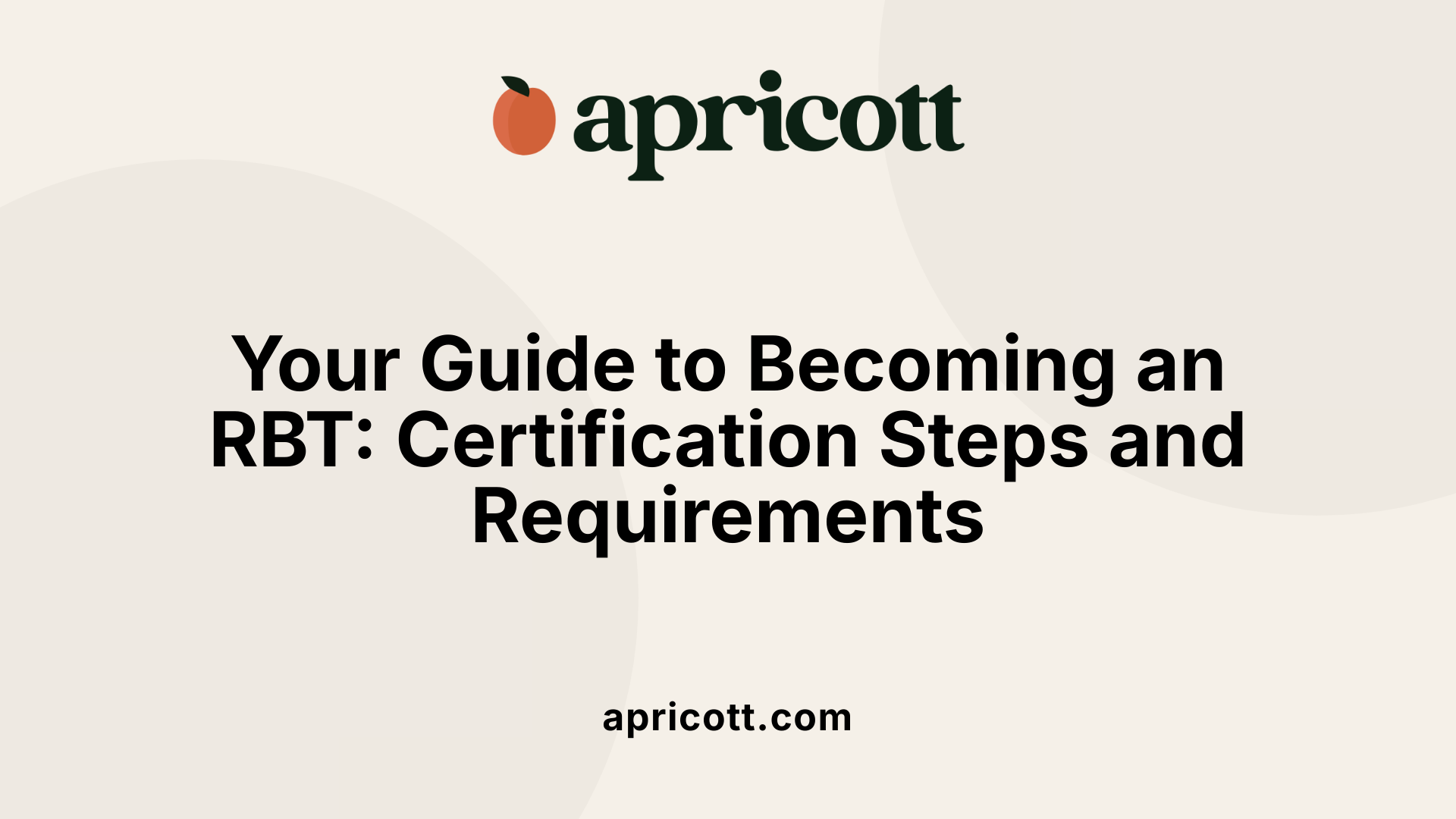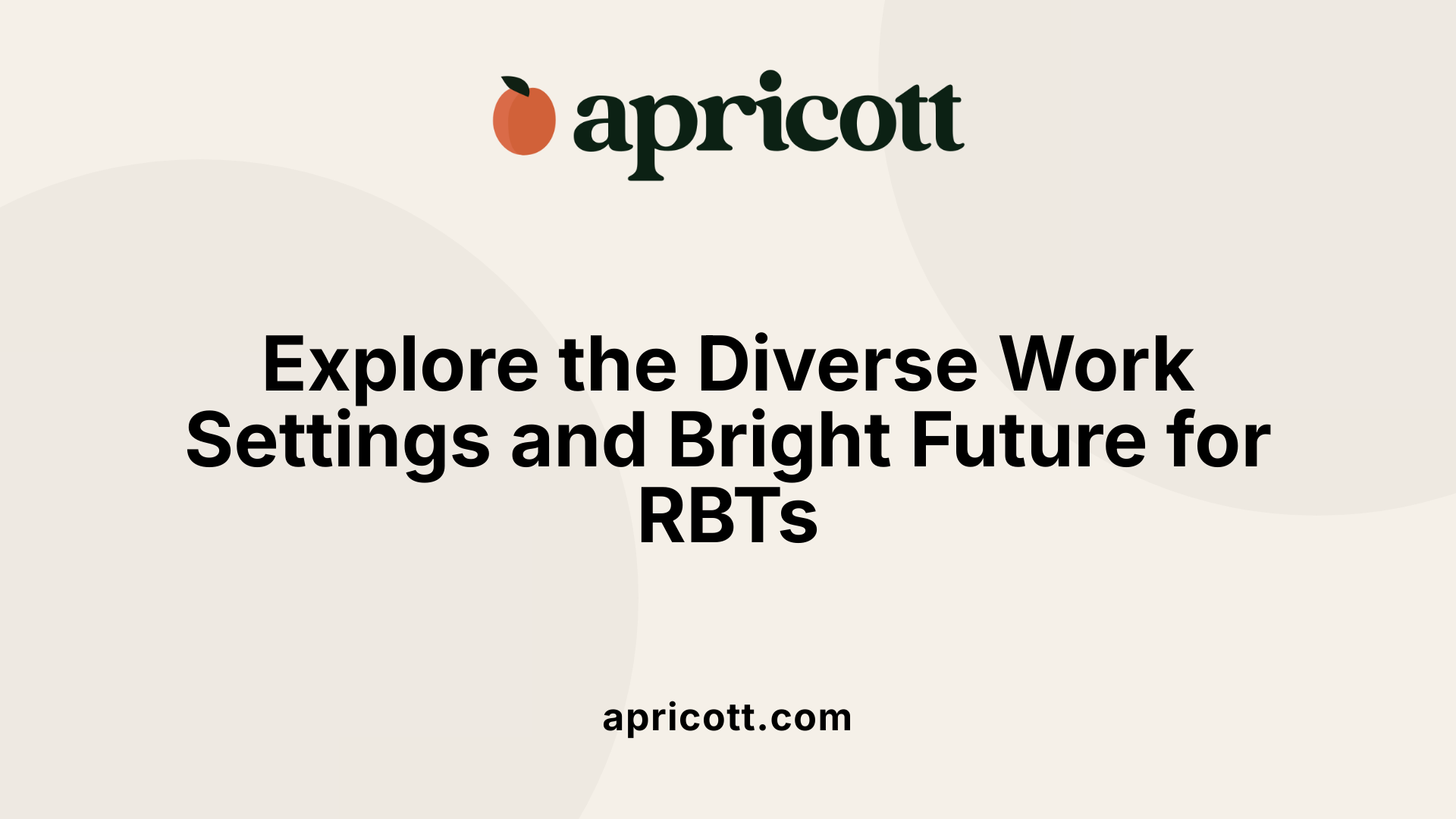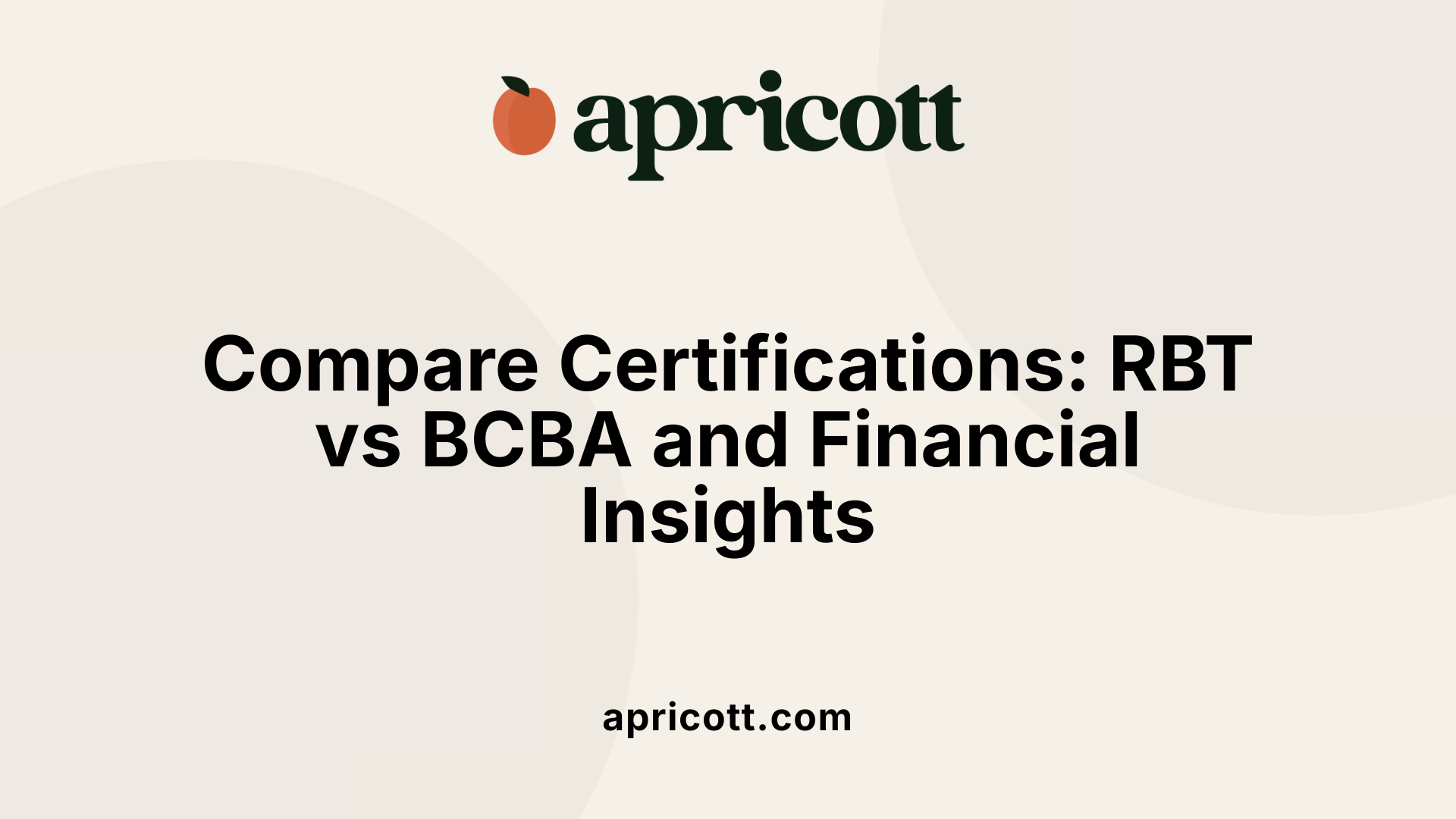July 21, 2025
Unlocking Opportunities: Evaluating the Value of RBT Certification in ABA
As awareness of autism spectrum disorder (ASD) and other behavioral challenges increases, so does the demand for qualified professionals in applied behavior analysis (ABA). Among the various credentials in this field, the Registered Behavior Technician (RBT) certification has become a popular entry point for many aspiring practitioners. This article explores whether pursuing RBT certification is ultimately worth it by examining its benefits, career prospects, requirements, and competitive landscape.

Registered Behavior Technicians (RBTs) play a vital role in the delivery of Applied Behavior Analysis (ABA) therapy. Their main task is to implement behavior intervention plans created by Board Certified Behavior Analysts (BCBAs) or Board Certified Assistant Behavior Analysts (BCaBAs). This involves providing direct, one-on-one support to clients, often individuals with autism spectrum disorder (ASD), mental health challenges, or behavioral difficulties.
RBTs are responsible for collecting detailed behavioral data during sessions. This information helps monitor progress and guides necessary adjustments to treatment plans. By accurately recording behaviors, RBTs ensure that therapies are both effective and personalized.
Supporting skill development is a core part of their work. They assist in teaching new skills, reducing problematic behaviors, and implementing strategies that promote positive outcomes. Collaboration is essential—RBTs regularly work with families, educators, and other professionals to ensure consistency and success in interventions.
Ethical compliance is crucial. RBTs maintain detailed documentation of their activities and follow strict standards set by certification boards. They also receive coaching and training to stay updated on evidence-based ABA practices, making sure they deliver safe, effective, and ethical care.
Overall, RBTs serve as the frontline implementers in ABA therapy, helping individuals with behavioral challenges improve their skills and quality of life through structured, compassionate support.

Becoming a Registered Behavior Technician (RBT) involves meeting several essential criteria and successfully completing a structured process. First, applicants must be at least 18 years old and possess a high school diploma or its equivalent.
Next, candidates are required to complete a 40-hour training program approved by the Behavior Analyst Certification Board (BACB). This training session covers fundamental principles of Applied Behavior Analysis (ABA), ethical practices, and intervention strategies essential for effective therapy.
After completing the training, individuals must demonstrate their competence through a formal assessment conducted by a qualified BACB certificant. This competency assessment ensures that the applicant understands how to apply ABA techniques correctly.
The subsequent step is application submission to the BACB. Applicants need to provide proof of completed training, competency demonstration, and pass a background check to qualify for certification.
Once the application is approved, candidates take a computer-based exam consisting of 85 multiple-choice questions. Achieving a passing score solidifies their status as an RBT.
Maintaining certification requires ongoing supervision and adherence to renewal guidelines. RBTs must regularly demonstrate continued competence and complete renewal requirements every year, ensuring they stay current with ethical and professional standards.
This process not only certifies an individual’s ability to deliver ABA services ethically and effectively but also opens doors to diverse employment opportunities in a growing field.
The field of applied behavior analysis (ABA) offers excellent career paths for those starting as RBTs. As awareness of autism spectrum disorder increases, so does the demand for qualified professionals in ABA therapy. This surge has led to a projected job growth rate of between 9% and 22% over the next decade, ensuring stable employment opportunities.
RBTs primarily work under supervision to implement treatment plans designed by BCBAs. With experience and additional training, they can pursue higher certifications like BCaBA (Board Certified Assistant Behavior Analyst) and BCBA (Board Certified Behavior Analyst). These advanced roles carry increased responsibilities, greater autonomy, and higher salaries.
Salaries for RBTs vary by location, with the average in the U.S. around $36,218 annually, and experienced professionals earning more than $50,000. Regions such as New Hampshire, Hawaii, and Pennsylvania tend to offer higher pay. The expanding scope of ABA therapy means that RBTs can find opportunities in diverse settings—schools, clinics, homes, and community programs.
Progressing within the field not only enhances earning potential but also opens doors to supervisory or specialized positions. Continuing education and networking are essential for advancement. As a result, RBTs have a promising career trajectory rooted in a rapidly growing area of healthcare.
Starting as an RBT is an excellent entry point into the world of behavior analysis. With commitment, ongoing learning, and experience, they can move upward to roles with more responsibility and influence, ultimately shaping a fulfilling professional journey.

The employment prospects for Registered Behavior Technicians (RBTs) are highly promising. The field is projected to grow between 12% and 17% over the next decade, which is much faster than many other professions. This positive trend is mainly due to the increasing diagnosis rates of autism spectrum disorder (ASD), with approximately 1 in 44 children affected today.
RBTs primarily work in various settings tailored to support individuals with ASD and other behavioral needs. Their work environments are diverse and flexible, including schools, clinics, homes, and community centers. These settings often require flexible schedules, as RBTs may work during evenings, weekends, or holidays to meet client needs.
Overall, the demand for RBTs continues to rise driven by increased insurance coverage for ABA therapy and greater awareness of the benefits of applied behavior analysis. Salaries range from about $35,000 at entry level to over $50,000 for seasoned RBTs, making this a rewarding and stable career path.
| Work Environment | Typical Conditions | Additional Notes |
|---|---|---|
| Schools | Full or part-time, daytime hours | Support educational interventions for students with ASD |
| Clinics | Structured therapy sessions | Often specialized centers for ABA therapy |
| Homes | In-home sessions, flexible scheduling | Personalized environments for client-specific care |
| Community settings | Outreach programs, community health centers | Broader support networks and behavioral programs |
As the landscape of behavioral health expands, the roles of RBTs are becoming more integral to providing quality care. The variety of work environments paired with strong growth prospects make becoming an RBT a highly attractive career choice, especially for individuals interested in making a meaningful difference while enjoying job stability and opportunities for advancement.
 The RBT certification serves as an entry-level credential in the field of applied behavior analysis (ABA). It prepares individuals to support behavior analysts by implementing treatment plans, collecting data, and providing direct support to clients, particularly those with autism spectrum disorder.
The RBT certification serves as an entry-level credential in the field of applied behavior analysis (ABA). It prepares individuals to support behavior analysts by implementing treatment plans, collecting data, and providing direct support to clients, particularly those with autism spectrum disorder.
In contrast, the BCBA (Board Certified Behavior Analyst) credential is a graduate-level certification. BCBAs are responsible for assessing behavioral challenges, developing treatment strategies, and supervising RBTs and other practitioners. To qualify for BCBA certification, candidates must hold a master's degree, complete 315 hours of coursework, perform supervised fieldwork, and pass a comprehensive exam.
This difference in education and responsibilities is reflected in salary levels. BCBAs generally earn substantially higher salaries, with the average in the U.S. around $68,500 annually, compared to approximately $36,200 for RBTs.
Financially, pursuing higher credentials involves additional costs. RBT candidates pay for 40 hours of training, exam fees, and renewal fees. For BCBAs, expenses include graduate tuition, coursework fees, supervised fieldwork costs, exam fees, and ongoing certification renewal costs.
| Certification | Educational Requirements | Responsibilities | Average Salary | Cost Components |
|---|---|---|---|---|
| RBT | High school diploma; 40-hour training | Implementing intervention plans, data collection | $36,200 | Training fees, exam fee, renewal fee |
| BCBA | Master's degree + coursework + supervised fieldwork | Assessing behaviors, developing treatment plans, supervising RBTs | $68,500 | Graduate tuition, coursework, supervision costs, exam fees |
Both certifications are crucial in delivering effective ABA therapy. RBTs form the frontline workforce, while BCBAs hold leadership and specialized roles, earning higher compensation.
For individuals considering careers in behavior analysis, starting as an RBT provides valuable experience and a stepping stone toward advanced credentials like BCBA, which offer greater responsibilities and earning potential.
 Becoming a Registered Behavior Technician (RBT) offers numerous benefits, especially for those interested in the rapidly expanding field of applied behavior analysis (ABA). RBTs have the opportunity to directly impact individuals with autism spectrum disorder (ASD), implementing behavior plans designed by Board Certified Behavior Analysts (BCBAs) and supporting clients in various settings such as homes, schools, and clinics. This role provides hands-on experience in a meaningful and rewarding environment, allowing professionals to develop valuable skills in behavior management and intervention.
Becoming a Registered Behavior Technician (RBT) offers numerous benefits, especially for those interested in the rapidly expanding field of applied behavior analysis (ABA). RBTs have the opportunity to directly impact individuals with autism spectrum disorder (ASD), implementing behavior plans designed by Board Certified Behavior Analysts (BCBAs) and supporting clients in various settings such as homes, schools, and clinics. This role provides hands-on experience in a meaningful and rewarding environment, allowing professionals to develop valuable skills in behavior management and intervention.
Another significant advantage is that an RBT certification serves as an accessible entry point into the field of ABA. It opens doors to professional growth and further certification options such as BCaBA and BCBA, which often come with higher salaries and responsibilities. Additionally, the demand for RBTs continues to grow, driven by increased awareness of autism and the need for behavioral support. The qualification is standardized, recognized across the industry, and can enhance employability and career stability.
However, there are challenges to consider. RBTs typically earn lower wages than those with more advanced credentials, with the average salary around $36,218 annually in the U.S. Entry-level positions may start around $30,000, though experienced professionals can earn over $50,000. The job also involves emotional demands, as RBTs often encounter challenging behaviors and must manage stress effectively. Ongoing supervision is a requirement, which can feel limiting and require adaptation. The work environment can be demanding, requiring flexibility, patience, and strict adherence to ethical standards.
In summary, becoming an RBT is a rewarding career choice for those passionate about helping others and eager to grow within a supportive and expanding field, but it also demands resilience, emotional strength, and a willingness to continue professional development.
The decision to pursue RBT certification hinges on individual career goals, financial considerations, and passion for behavioral health. As a credential, RBT offers a clear pathway into the expanding field of ABA, with opportunities for growth, specialization, and meaningful client work. While initial costs and responsibilities are notable, the certification serves as a valuable stepping stone toward advanced positions like BCBA, which provide higher salaries and broader influence. For those committed to making a direct impact in the lives of individuals with ASD and other behavioral challenges, obtaining RBT certification can indeed be a worthwhile investment.